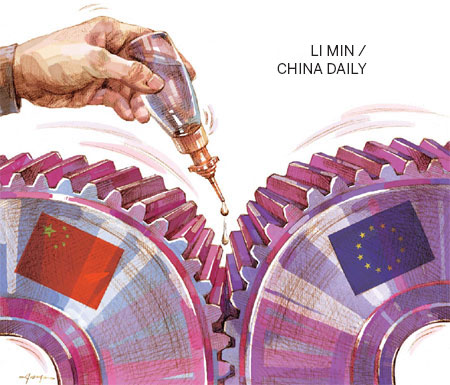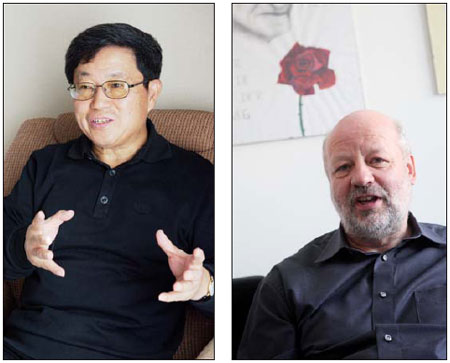Geared to go
Updated: 2013-05-24 09:04
By Fu Jing (China Daily)
|
|||||||||||

|
Left: Chi Fulin, president of the China Institute for Reform and Development. Right: Hans-Josef Fell, member of the German parliament. Photos Provided to China Daily |
China and Europe will take significant steps to bolster bilateral ties during Premier Li Keqiang's visit
China's commitment to peaceful global development will be the main focus of talks Premier Li Keqiang will have with European leaders during his first trip to the continent since taking office.
Though bilateral relations between China and the European Union have more or less been on a strong footing, trade disputes have recently marred prospects for smooth relations. Though Brussels' latest salvo of planned punitive action against Chinese solar panel exporters does pose short-term problems, observers suggest Li may choose to focus more on the biggest picture of strengthening bilateral ties.
During his four-day visit to Switzerland and Germany, he is likely to use "clear language" to promote smooth trade flows and prevent escalation of trade disputes between China and the EU, they say.
"It is an important visit and I am confident that Li will unveil several visionary messages to show the strong inter-dependency between the two sides and China's willingness to maintain policy consistence in Europe," says Chi Fulin, a political adviser and president of the China Institute for Reform and Development.
"Of course, he will also warn the Europeans subtly that trade wars do not benefit anyone," Chi says. "His message would also be to forge good examples of harmonious China-EU ties."
Hans-Josef Fell, a member of the German parliament, welcomes Li's visit to his country and feels that the European Commission's recent decision to levy 47 percent punitive provisional tariffs against China's photovoltaic products, worth $20 billion annually, was inappropriate.
"Brussels' decision does not have the backing of any German political party. I expect Li to reiterate his commitment to support fair and free trade and also China's desire to fight protectionism," Fell says, adding that Li's message may extend beyond trade issues.
Official sources in Beijing have labeled Li's four-nation tour as an important diplomatic initiative of the new leadership following Chinese President Xi Jinping's visit to Russia and Africa in March. Li's visit to Switzerland and Germany follows visits to India and Pakistan, two crucial neighbors of China.
During Li's visit, China is also expected to conclude a free trade agreement with Switzerland, a non-European Union bloc country, after nine rounds of tough negotiations. In Germany, China is expected to sign several multi-billion-dollar agreements, look to strengthen bilateral relations across all fronts and build closer bonds with top German politicians including Chancellor Angela Merkel.
FTA prospects
|
||||
Though final negotiations are still under way even after nine rounds of talks at the time of going to press, observers indicate that "both sides are fighting hard to gain more last-minute benefits from the negotiations". Indicating that such scrambling is normal in FTA talks, the sources indicated that there are no major hurdles for a deal.
Zhang Haiyan, professor of trade and investment at the Antwerp Management School in Belgium, says that China's FTA with Switzerland is of great importance. "This is because of the bigger trade volume between China and Switzerland, compared with that of Iceland," Zhang says.
Iceland, the first developed European country to recognize China as a full market economy as well as the first European country to negotiate a free trade agreement with it, signed its deal with China during Prime Minister Johanna Sigurdardottir's visit to Beijing last month.
According to official statistics, China-Iceland bilateral trade was worth $180 million last year, up 21 percent year-on-year. China's exports to Iceland amounted to $95.39 million, up 24.6 percent, while imports from Iceland stood at $88.96 million, up 17.7 percent.
However, trade between China and Switzerland had already surpassed $30 billion in 2011. The main aim of the FTA with Switzerland is to promote trade and investment between both countries by eliminating or reducing tariffs on most goods, removing non-tariff barriers, improving market access for goods and services, and intensifying economic cooperation.
However, food and agriculture continue to be thorny issues, as Switzerland wants to increase exports to China. Zhang says that the FTA between China and Switzerland will be the cornerstone for more FTAs with other European nations.
Pierre Defraigne, executive director of the Brussels-based Madariaga-College of Europe Foundation, says Switzerland is an interesting country for China as it is strong in high-tech and sophisticated financial services, has a strong interest in multilateralism and has a grass-roots democratic tradition.
"An FTA with Switzerland which might make sense as a bilateral deal, would, however, not provide Beijing with enough insurance to make inroads into the broader EU market," Defraigne says.
Related Stories
Lasting impressions, fond memories 2013-05-24 09:04
Gateway to Europe 2013-05-24 09:04
Long-term smart solutions needed 2013-05-24 09:04
Li gets to lay out China's vision 2013-05-24 09:04
Today's Top News
List of approved GM food clarified
ID checks for express deliveries in Guangdong
Govt to expand elderly care
University asks freshmen to sign suicide disclaimer
Tibet gears up for new climbing season
Media asked to promote Sino-Indian ties
Shots fired at Washington Navy Yard
Minimum growth rate set at 7%
Hot Topics
Lunar probe , China growth forecasts, Emission rules get tougher, China seen through 'colored lens', International board,
Editor's Picks

|

|

|

|

|

|










